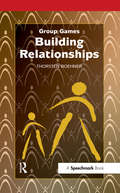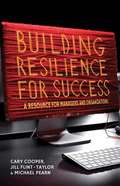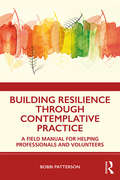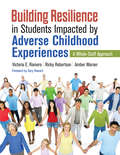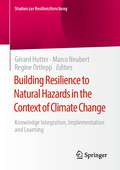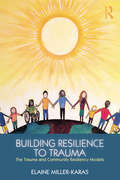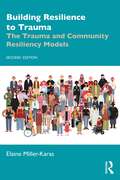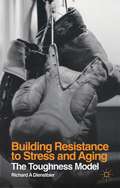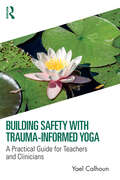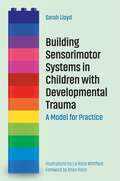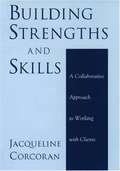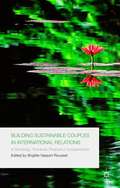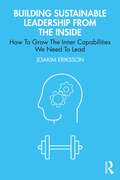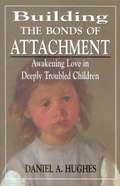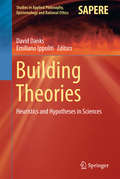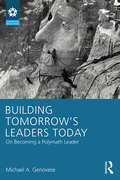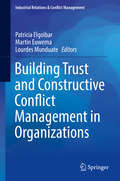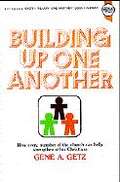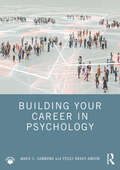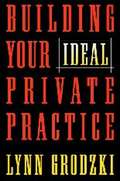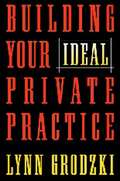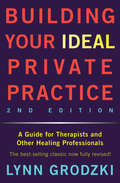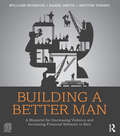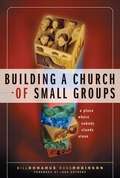- Table View
- List View
Building Relationships (Group Games)
by Lilo Seelos Thorsten BoehnerGroup Games: Building Relationships Thorsten Boehner - A comprehensive collection of 140 games and activities to foster personal development; improve social communication skills; and strengthen group dynamics. Full of practical and creative ideas that can be implemented with minimal preparation and equipment. 140 games and activities to foster personal development; improve social communication skills; and strengthen group dynamics. Full of practical and creative ideas that can be implemented with minimal preparation and equipment. Suitable for all ages, the games will increase self- and other-awareness; improve recognition of one's own limits as well as awareness of the limits of others; encourage better teamwork skills; and increase flexibility as participants gain new experiences in a playful and safe environment. Includes: Group gel activities; Warm-up activities; Exercises for building trust and awareness; Imagination and improvisation; Closing exercises; Special exercises and tips for amateur dramatics lovers.
Building Resilience For Success
by Cary L. Cooper Jill Flint-Taylor Michael PearnResilience is a word that is used in many different ways in different contexts, this new and innovative book focuses on psychological resilience in the workplace, examining other key aspects such as physical health and resilient teams, drawing from the latest research and the authors own practical experience.
Building Resilience Through Contemplative Practice: A Field Manual for Helping Professionals and Volunteers
by Bobbi PattersonRecasting burnout as a crucial phase of service, Building Resilience Through Contemplative Practice uses real-world case studies to teach professionals and volunteers unique skills for cultivating resilience. Viewing service and burnout as interdependent throughout phases of stability, collapse, reorganization, and exploitation, the book uniquely combines elements of adaptive resilience theory with contemplative practices and pedagogies. Drawing on the author’s extensive experience working at the intersection of service and contemplative practices, this is the first book to demonstrate how and why professionals and volunteers can reframe burnout as an opportunity for resilience-building service. User-friendly case studies provide tools, skills, and exercises for reconstructive next steps. Chapters address personal, group, and structural levels of service and burnout. Illuminating the link between adaptive resilience and burnout as a normal and useful phase of service, Building Resilience Through Contemplative Practice is a necessary resource for professionals and volunteers across a wide range of service settings.
Building Resilience in Students Impacted by Adverse Childhood Experiences: A Whole-Staff Approach
by Victoria E. Romero Ricky Robertson Amber N. WarnerUse trauma-informed strategies to give students the skills and support they need to succeed in school and life Nearly half of all children have been exposed to at least one adverse childhood experience (ACE), such as poverty, divorce, neglect, homelessness, substance abuse, domestic violence, or parent incarceration. These students often enter school with behaviors that don’t blend well with the typical school environment. How can a school community come together and work as a whole to establish a healthy social-emotional climate for students and the staff who support them? This workbook-style resource shows K-12 educators how to make a whole-school change, where strategies are integrated from curb to classroom. Readers will learn how to integrate trauma-informed strategies into daily instructional practice through expanded focus on: The different experiences and unique challenges of students impacted by ACEs in urban, suburban, and rural schools, including suicidal tendencies, cyberbullying, and drugs Behavior as a form of communication and how to explicitly teach new behaviors How to mitigate trauma and build innate resiliency through a read, reflect, and respond model Let this book be the tool that helps your teams move students away from the school-to-prison pipeline and toward a life rich with educational and career choices. "I cannot think of a book more needed than this one. It gives us the tools to support our students who have the most need while practicing the self-care necessary to continue to serve them." —Lydia Adegbola, Chair of English Department New Rochelle High School, NY "This book highlights the impact of trauma on children and the adults who work with them, while providing relevant and practical strategies to understand and address it through reflective practices." —Marine Avagyan, Director, Curriculum and Instruction Saugus Union School District, Sunland, CA
Building Resilience in Students Impacted by Adverse Childhood Experiences: A Whole-Staff Approach
by Victoria E. Romero Ricky Robertson Amber N. WarnerUse trauma-informed strategies to give students the skills and support they need to succeed in school and life Nearly half of all children have been exposed to at least one adverse childhood experience (ACE), such as poverty, divorce, neglect, homelessness, substance abuse, domestic violence, or parent incarceration. These students often enter school with behaviors that don’t blend well with the typical school environment. How can a school community come together and work as a whole to establish a healthy social-emotional climate for students and the staff who support them? This workbook-style resource shows K-12 educators how to make a whole-school change, where strategies are integrated from curb to classroom. Readers will learn how to integrate trauma-informed strategies into daily instructional practice through expanded focus on: The different experiences and unique challenges of students impacted by ACEs in urban, suburban, and rural schools, including suicidal tendencies, cyberbullying, and drugs Behavior as a form of communication and how to explicitly teach new behaviors How to mitigate trauma and build innate resiliency through a read, reflect, and respond model Let this book be the tool that helps your teams move students away from the school-to-prison pipeline and toward a life rich with educational and career choices. "I cannot think of a book more needed than this one. It gives us the tools to support our students who have the most need while practicing the self-care necessary to continue to serve them." —Lydia Adegbola, Chair of English Department New Rochelle High School, NY "This book highlights the impact of trauma on children and the adults who work with them, while providing relevant and practical strategies to understand and address it through reflective practices." —Marine Avagyan, Director, Curriculum and Instruction Saugus Union School District, Sunland, CA
Building Resilience to Natural Hazards in the Context of Climate Change: Knowledge Integration, Implementation and Learning (Studien zur Resilienzforschung)
by Marco Neubert Gérard Hutter Regine OrtleppUrban resilience and building resilience are “hot topics” of research and practice on sustainability in the context of climate change. The edited volume advances the “state of art” of urban resilience research through focusing on three important processes of building resilience: knowledge integration, implementation, and learning. In the volume, knowledge integration primarily refers to the combination of specialized knowledge domains (e.g., flood risk management and urban planning). Implementation refers to realized specific changes of the building stock and related green, blue and grey infrastructures at local level (e.g., for dealing with rising temperatures and heat waves at the neighborhood scale in cities). Learning requires moving beyond single projects and experiments of resilience to enhance sustainability at city and regional scale. The editors adopt an interdisciplinary approach to this volume of the Springer series on resilience. The volume includes contributions from civil engineering, physical geography, the social sciences, and urban planning.
Building Resilience to Trauma: The Trauma and Community Resiliency Models
by Elaine Miller-KarasAfter a traumatic experience, survivors often experience a cascade of physical, emotional, cognitive, behavioral, and spiritual responses that leave them feeling unbalanced and threatened. Building Resilience to Trauma explains these common responses from a biological perspective, reframing the human experience from one of shame and pathology to one of hope and biology. It also presents alternative approaches, the Trauma Resiliency Model (TRM) and the Community Resiliency Model (CRM), which offer concrete and practical skills that resonate with what we know about the biology of trauma. In programs co-sponsored by the World Health Organization, the Unitarian Universalist Service Committee, ADRA International and the department of behavioral health of San Bernardino County, the TRM and the CRM have been used to reduce and in some cases eliminate the symptoms of trauma by helping survivors regain a sense of balance. Clinicians will find that they can use the models with almost anyone who has experienced or witnessed any event that was perceived as life threatening or posed a serious injury to themselves or to others. The models can also be used to treat symptoms of vicarious traumatization and compassion fatigue.
Building Resilience to Trauma: The Trauma and Community Resiliency Models
by Elaine Miller-KarasDuring and after a traumatic experience, survivors experience a cascade of physical, emotional, cognitive, behavioral, relational, and spiritual responses that can make them feel unbalanced and threatened. The second edition of Building Resilience to Trauma explains common responses from a biological perspective, reframing the human experience from one of shame and pathology to one of hope and biology. Using two evidence-informed models of intervention that are trauma-informed and resiliency-informed—the Community Resiliency Model (CRM) and the Trauma Resiliency Model (TRM)—chapters distill complex neuroscience into understandable concepts and lay out a path for fostering short- and long-term healing. CRM develops natural leaders who share wellness skills throughout communities as primary prevention, and TRM focuses on training mental health professionals to reprocess traumatic experiences. Studies have demonstrated that the models’ use leads to significant reductions in depression and anxiety, and both models also lead to increases in well-being. The models restore balance after traumatic experiences and can be used as tools to cultivate well-being across cultures and abilities throughout the lifespan. Program cosponsors have included the United Nations, Emory University's Center for Contemplative Science and Compassion-Based Ethics, the Victims and Survivors Network of Northern Ireland, PACES Connection, the International Transformational Resilience Coalition, the Adventist Disaster Relief Agency International, Wake County School System, and the State of Washington Police Commission.
Building Resistance To Stress And Aging
by Richard A. DienstbierBy becoming tough we preserve those physical and mental capacities that are degenerated by stress and by aging. The toughness model proposed in this book incorporates psychological research and neuroscience to explain how a variety of toughening activities - ranging from confronting mental and physical challenges to meditation and even giving and receiving nurturance - sustain our brains and bodies. These activities affect genetic processes that build neurochemical capacities and rebuild degraded brain structures. The physiological toughness leads, in turn, to improved mental/psychological faculties ranging from emotional stability to fluid intelligence and the preservation of our capacity to form memories.
Building Safety with Trauma-Informed Yoga: A Practical Guide for Teachers and Clinicians
by Yael CalhounBuilding Safety with Trauma-Informed Yoga is an accessible, science-based guide for clinicians, yoga teachers, teachers in training, and practitioners. The book provides clear ideas on how to support diverse groups in trauma recovery and in building resiliency skills. The easy-to-follow format is organized around the three key principles of building safety, supporting empowerment, and maintaining simplicity. Readers will find free downloadable support materials on the author's website, including handouts, flyers, scripts, and audio and video recordings.
Building Sensorimotor Systems in Children with Developmental Trauma: A Model for Practice
by Sarah LloydBabies and young children who have experienced early adversity miss out on good, nurturing relationships, and the sensorimotor development that goes along with them. Their bodies therefore lack a solid foundation for sensory integration. This book lays out a practice model - the Building Underdeveloped Sensorimotor Systems (BUSS) model - to help identify and assess whether these gaps are present in a child's sensorimotor systems. It also advocates the potential of rebuilding the gaps in these systems - using games and activities that take place within loving parent-child relationships - to offer the child a healthy, attuned base from which to develop sensorimotor skills. Also included is a section on parents' experiences of using these activities with their children. With a positive view of approaching sensorimotor underdevelopment, these strategies and case studies all demonstrate that, with the right kind of attention, these children's systems can be rebuilt.
Building Strengths and Skills: A Collaborative Approach to Working with Clients
by Jacqueline CorcoranThis is a much-needed practice book that demonstrates how helping professionals can emphasize their clients' resilience, strength, and capacities, rather than focusing on pathology or deficits. It offers an integrative practice model for both assessment and intervention that interweaves strengths-based (specifically solution-focused therapy and motivational interviewing) and skills-building (cognitive-behavioral) approaches. In the strengths-and-skills-based model, helping professionals assume that clients possess the necessary capacities to solve their own problems, transforming the therapeutic relationship into a collaboration focused on bolstering motivation and resources for change. When these resources are exhausted or when deficits become a substantial barrier, then practitioner and client work to develop an individualized skills-building plan. A wide range of examples, written by Jacqueline Corcoran with experts from different fields of practice, clearly demonstrate how the model can be applied to individuals and families struggling with behavior problems, depression, substance abuse, anxiety, violence, and abuse, so that both strengths and skills maximize the client's success. This innovative, dynamic resource is a must have for practitioners across the helping, social service, and mental health professions.
Building Sustainable Couples in International Relations
by Brigitte Vassort-RoussetThe contributors analyse the key roles in constructing peaceful international couple relationships and their foreign-policy outcomes, at a time of acute trust deficit in international affairs. They show that to establish prospects of conflict transformation and sustainable international policy cooperation, the most positive long-term impact derives from sub-state intermediary levels and middle-class elites promoting integration through incremental identity-change, rather than from diplomatic engagement between rivals (despite the relevance of leaders embedded in institutional frameworks for facilitating rapprochement). A differentiation approach is applied throughout the volume, revealing the various mechanisms at work, moving from the rationalist to the sociological, from intergovernmental strategic bargaining to societal integration and the construction of new identities below the state-level.
Building Sustainable Leadership from the Inside: How To Grow The Inner Capabilities We Need To Lead
by Joakim ErikssonDrawing on contemporary neuroscience, this book shows leaders how they can literally train their mind to become more resilient and have a more sustainable impact.This is a research‑backed and practical guide for how to grow inner capabilities enabling sustainable leadership in this time. It is built around five areas that many leaders will recognize as being challenging on a personal level, such as how to stay calm under pressure, navigate in uncertainty or collaborate skilfully with people with diverse points of views. While many leadership books describe the importance of such traits, few show how to actually cultivate them. Grounded in multiple fields of research, this book offers a practical training manual for the mind. With more than 40 reflections and exercises, it offers a guided tour to an ‘inner gym’, showing readers how to cultivate these capabilities.Leaders who have realized that it takes more than IQ and theoretical knowledge to create sustainable impact and are looking for ways to deepen their leadership capacity and authenticity will find them in this practical training manual for the mind.
Building The Bonds Of Attachment: Awakening Love In Deeply Troubled Children
by Daniel A. HughesWith the unmistakable authority of a clinician, Dan Hughes builds a stirring story around the composite figure of Katie--a fragmented, tormented, isolated little girl in foster care whose terror, shame, rage and despair drive her to deeds like lacing the family hamburger with her own feces--in order to expose the tragedy of the attachment-impaired child. The author also affirms and demonstrates the possibility of transformative intervention. Allison is the confident, compassionate, and controversial therapist who diagnoses and treats Katie's profound attachment disorder. Jackie is the therapeutic foster mother who fights to create a lasting bond with Katie by applying Allison's blend of affective attunement and effective discipline. Dr. Hughes speaks in both popular and clinical voices as he animates Katie's demoralizing but eventually reparative odyssey through more homes than any child should have to live in, drawing on his decades of experience with foster and adopted youngsters, their families, and the professionals who support them. Building the Bonds of Attachment: Awakening Love in Deeply Troubled Children is richly webbed with commentary on the dynamics of that odyssey, and also on the separate and tandem roles of case manager, therapist, and parent-surrogate.
Building Theories: Heuristics and Hypotheses in Sciences (Studies in Applied Philosophy, Epistemology and Rational Ethics #41)
by Emiliano Ippoliti David DanksThis book explores new findings on the long-neglected topic of theory construction and discovery, and challenges the orthodox, current division of scientific development into discrete stages: the stage of generation of new hypotheses; the stage of collection of relevant data; the stage of justification of possible theories; and the final stage of selection from among equally confirmed theories. The chapters, written by leading researchers, offer an interdisciplinary perspective on various aspects of the processes by which theories rationally should, and descriptively are, built. They address issues such as the role of problem-solving and heuristic reasoning in theory-building; how inferences and models shape the pursuit of scientific knowledge; the relation between problem-solving and scientific discovery; the relative values of the syntactic, semantic, and pragmatic view of theories in understanding theory construction; and the relation between ampliative inferences, heuristic reasoning, and models as a means for building new theories and knowledge. Through detailed arguments and examinations, the volume collectively challenges the orthodox view's main tenets by characterizing the ways in which the different "stages" are logically, temporally, and psychologically intertwined. As a group, the chapters provide several attempts to answer long-standing questions about the possibility of a unified conceptual framework for building theories and formulating hypotheses.
Building Tomorrow's Leaders Today: On Becoming a Polymath Leader (Leadership: Research and Practice)
by Michael A. GenoveseThis book focuses on leadership -- what it is, how it works, and how complex, multi-layered and multi-dimensional it is -- and how it will change in the years ahead. If we are to build tomorrow’s leaders today, we need to anticipate what skills, temperaments, and specific competencies will be valuable as we face future needs. If the past is a predictor of the future, the world of tomorrow will be characterized by rapid change, new technology, greater diversity, increased globalization, and the need for lifelong learning. As a political scientist and presidential scholar, Michael Genovese incorporates a wide range of disciplinary perspectives and research on leadership in this book to give students, practitioners, and leadership scholars a welcome and engaging look to the future.
Building Trust and Constructive Conflict Management in Organizations (Industrial Relations & Conflict Management)
by Patricia Elgoibar Martin Euwema Lourdes MunduateThis book presents the most recent theoretical insights and practical intervention methods to (re)build trust between management and organized employees in organizations. Offering a multidisciplinary perspective on trust and conflict management in organizations, the book draws from diverse fields such as organizational psychology, business, law, industrial relations and sociology. It examines the often encountered breaches of trust between management and organized workers, and the resulting destructive social conflicts, social actions, strikes or dramatic business decisions. Its focus is on trust and conflict management at the organizational level in an industrial relations context: that of employee representatives and management. The book introduces a new theoretical approach: the Tree of Trust, designed to analyse and mediate the interconnected levels of trust and distrust in industrial relations. It presents case studies and practical recommendations to build trust and constructive conflict management in the organizations, and illustrates these by means of experiences from different countries around the globe.
Building Up One Another
by Gene A. GetzFrom the book: ... when all the "one another" exhortations are studied carefully, and grouped together according to specific meanings, they can be reduced to approximately 12 significant actions Christians are to take toward "one another" to help build up the body of Christ. This is what this book is about. It includes 12 chapters built around these powerful exhortations. You'll find it more than just a study of what these injunctions mean. Each chapter includes a practical section: a series of steps for putting these exhortations into action in your local church. These practical sections represent more than mere theory. They have been tried and tested. They work. When these injunctions are not only talked about but applied, you'll be involved in one of the most dynamic forces on earth-the functioning body of Jesus Christ.
Building Your Career in Psychology
by Marie S. Hammond Peggy Brady-AmoonBuilding Your Career in Psychology is a new practical, aspirational, and experiential book designed to help readers make informed decisions about their college, career, and life success. The primary theme in this book is that psychological knowledge makes a difference in people’s lives. Building on this theme, this book provides an empowered process for making the most of college and other career preparation experience, helping the reader to set the stage for academic, career, and life success. This book emphasizes academic skills, unwritten rules, career planning, and developing relationships – both professional and personal. Moreover, this book includes evidence-based career development content and exercises, as well as other resources to assist readers in discovering their own path to a meaningful career and life. Highlights of this book include: Discussion of career options at the bachelor’s, master’s, and doctoral levels Forms, handouts, and exercises (both basic and advanced) to facilitate deeper processing and application of content References and resources for further information Website with additional information, including instructor resources Recognition and respect for the diversity of people, their experiences, and paths Featuring the best practices in facilitating career decision-making and planning, this book is a must read for undergraduate and graduate students in psychology courses as well as anyone interested in a career in psychology.
Building Your Ideal Private Practice: A Guide for Therapists and Other Healing Professionals
by Lynn GrodzkiProfessional business coach and psychotherapist in private practice discusses psychological and business strategies for developing a successful private practice. Includes information on dealing with managed care, as well as how to adapt to an ever-changing marketplace.
Building Your Ideal Private Practice: A Guide for Therapists and Other Healing Professionals
by Lynn GrodzkiWould you like to: Make more money in your private practice? Attract more ideal clients? Generate a flow of quality referrals? Revitalize your existing practice? Have increased confidence as a business owner? In this book, psychotherapist and business coach Lynn Grodzki acts as your personal business coach and shows you how to build an ideal private practice--one that is both highly profitable and personally satisfying. Today, being a talented professional is not enough to ensure the success of your private practice; you also need to be an enthusiastic, talented businessperson. Grodzki's business strategies are effective and immediately useful for a wide range of private practitioners, including social workers, psychologists, psychiatrists, massage therapists, energy healers, life coaches, and chiropractors. Whether you are just starting out as an independent practitioner or looking to revitalize an existing practice, Building Your Ideal Private Practice provides a foundation for business and personal growth that will lead you to a new level of personal and financial enrichment. Presenting innovative business concepts in a format specifically adapted for the therapeutic profession, this book guides professionals at all stages of their careers. Bringing together years of experience and the key elements from her Private Practice Success Program with an easy and accessible writing style, Grodzki's book will help you not only build a successful practice outside managed care, but also ensure that your business reflects your true values and talents.
Building Your Ideal Private Practice: A Guide for Therapists and Other Healing Professionals (Second Edition)
by Lynn Grodzki<p>A much-anticipated second edition to this classic practice-building text. <p><i>Building Your Ideal Private Practice</i>, a best-seller in its genre, is now fully revised after its original publication in 2000. Much has changed for therapists in private practice over the past fifteen years, including the widespread encroachment by insurance and managed care into the marketplace, the density of new therapists as over 600,000 therapists nation-wide try to stay viable, and the role of the Internet in marketing services. The revision of <i>Building Your Ideal Private Practice</i> is a comprehensive guide, updated with six new chapters and targeted for therapists at all stages of private practice development. It covers the essential how-to questions for those starting out in practice and explains the common pitfalls to avoid. <p>For those already in practice, worried about profitability in an age of increasing competition, the author offers informed strategies such as the best way to create websites and other online marketing to find clients, and then goes further to explain how to retain the new breed of fickle clients who shop for therapists online, but are hard to satisfy. Other new chapters support veteran therapists edging towards retirement, including how to sell a therapy business for a profit or whether to stay working solo or expand into a more lucrative group business model. <p>The revision comprises a complete, easy to use and fascinating business plan that shows therapists not just what to do, but also who to be in order to succeed. It adds depth, up-to-date information and a wealth of strategies to the original book, often referred to as the "bible" for therapists in private practice. Like the original, the revision conveys the author's experience, optimism and warmth as she presents case examples, checklists and exercises to make the business advice come alive. <p>Whether you have insurance-based or a fee-for-service practice, this book will help you thrive.</p>
Building a Better Man: A Blueprint for Decreasing Violence and Increasing Prosocial Behavior in Men
by William Seymour Héctor Torres Ramel SmithBuilding a Better Man presents a theory and science based discussion of masculinity in modern America, but it also does much more than that—it interweaves a diverse group of compelling personal stories with an exploration of aggression and masculinity in the socialization of boys and men. Where other programs tend to subtly denigrate men as perpetrators and focus on stopping the problematic behavior, Building a Better Man tries to understand the external forces that impinge on the developmental experiences of boys/men and broadens the scope of inquiry into their behavior by reviewing a range of external societal forces that contribute to the problems. Clinicians and group leaders will find that the approach laid out in Building a Better Man leaves clients feeling understood more than judged, which provides a different motivation for change and can set treatment on an entirely different and infinitely more productive path.
Building a Church of Small Groups
by Russ Robinson Bill DonhueChurch Should Be the Last Place Where Anyone Stands AloneOur hearts were made for deep, authentic relationships. For community. And like nothing else, small groups provide the kind of life-giving community that builds and empowers the body of Christ and impacts the world. At Willow Creek Community Church, small groups are so important that they define the core organizational strategy. Willow Creek has gone from being a church with small groups to being a church of small groups. Sharing insights from that transition, its two chief architects tell how your church-whatever its size and circumstances-can become a place where people of all ages can experience powerful, transforming community. Part one presents the theological, sociological, and organizational underpinnings of small groups. You'll discover why they are so vital to church health. Part two moves you from vision to practice. Part three shows you how to identify, recruit, train, and support group leaders. And part four helps you deal with the critical process of change as your church develops its small group ministry. "Bill Donahue and Russ Robinson have not just thought and read and talked about community. They have rolled up their sleeves and devoted their vocational lives to figuring out how to actually help make it happen with real-life people in a real-life church. "-John Ortberg, author, If You Want to Walk on Water, Get Out of the Boat
